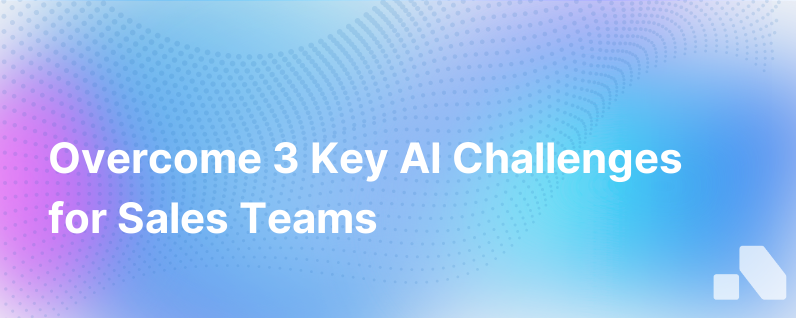The Top 3 Challenges In Implementing Ai For Sales Teams
Published on August 27, 2023 by Sawyer Middeleer
Artificial intelligence (AI) is altering the landscape of sales by delivering insights that were previously unattainable and automating tasks that took up valuable time. Whether it's through predictive analytics, intelligent lead scoring, or automating data entry, AI has the power to transform how sales teams operate. However, harnessing the full potential of AI is not without its challenges.
From technological adoption barriers to concerns about data quality and integration, these challenges hinder many businesses from implementing an effective AI sales strategy. Here we will explore the top three challenges in implementing AI for sales teams and suggest strategies for overcoming these hurdles so organizations can fully embrace the power of AI.
1. Integration with Existing Systems:
One of the largest obstacles sales teams face when adopting AI technology is the integration with existing sales infrastructures. Many organizations have an ecosystem of tools and technologies they use for their sales processes. These legacy systems may include customer relationship management (CRM) platforms, email marketing software, communication tools, and more.
Challenges:
- Compatibility: Older systems that aren’t designed to interact with new AI technologies can create compatibility issues.
- Data Silos: Companies often have data spread across multiple platforms which can lead to disjointed insights and duplicate data entry.
- User Adoption: Sales teams may resist migrating to new technologies, especially if it disrupts their current workflow.
Solutions:
- APIs and Middleware: Utilize APIs or middleware solutions to facilitate the communication between AI technologies and existing systems.
- Incremental Integration: Phased implementation can help ease the transition process for sales teams.
- Training and Support: Offering extensive training and support can accelerate user adoption.
2. Data Quality and Quantity:
AI systems are powered by data. The quantity, quality, and relevance of the data you feed into an AI system directly affect the insights you garner and the predictions made by the system. As the saying goes, "garbage in, garbage out" – this is particularly true for AI in sales.
Challenges:
- Inaccurate Data: AI predictions can be flawed if the input data is inaccurate, outdated, or biased.
- Insufficient Data: A lack of sufficient historical data can leave AI models without enough information to accurately predict outcomes or identify patterns.
- Data Governance: Establishing ownership, access, and the management of data are complex but necessary to ensure compliance with regulations like GDPR.
Solutions:
- Regular Data Cleaning: Ensuring that data is up-to-date and accurate through regular audits and clean-ups.
- Data Enrichment: Augmenting existing data with external sources can provide more robust datasets for AI analysis.
- Establishing Data Protocols: Creating and enforcing data governance policies to ensure responsible data management.
3. The Complexity of Sales Processes:
Sales is a multifaceted domain with complex relationships and varying sales cycles. AI in sales is about more than just number crunching; it needs to interpret and predict human behavior, which is inherently unpredictable. This adds a layer of complexity to implementing AI in sales, which goes beyond the technical challenges.
Challenges:
- Understanding Nuances: AI may not initially grasp the nuances of complex sales cycles or the subtleties of human interactions.
- Customization: AI solutions are not one-size-fits-all and require customization to fit specific sales processes and methodologies.
- Expectation Management: There is often a misconception that AI will work right out of the box without understanding that it requires tuning and learning over time.
Solutions:
- Close Collaboration with Sales Teams: AI development should involve sales professionals to incorporate domain expertise into the algorithms.
- Iterative Development: Implement AI solutions in an agile and iterative manner, allowing for continuous learning and adjustments.
- Set Realistic Expectations: Educate stakeholders about the realistic capabilities and limitations of AI within the sales process.
Overarching Strategies for Addressing AI Challenges in Sales:
Leadership Buy-In: It’s essential for leadership to understand and support the transition to AI-enhanced sales processes. Championing from the top can help secure the necessary resources and foster a culture of innovation.
Partnerships with AI Experts: Developing a relationship with AI vendors or consultants who specialize in sales can bring valuable expertise to the table. These partnerships can help tailor AI solutions to your organization's unique challenges.
Emphasizing the Value of AI: By showcasing success stories and quantifying the improvements achieved through AI, companies can motivate their teams to embrace AI.
Implementing AI with Aomni:
While each organization's journey is unique, platforms like Aomni can offer a seamless and simplified approach to AI. Aomni AI offers a range of solutions that can be tailored to each sales team’s specific needs, providing the tools necessary for strategic selling. With real-time account research, actionable competitive insights, and personalized sales content, sales teams can transform their processes without the typically associated burdens.
In conclusion, while the adoption of AI in sales comes with its share of challenges, these can be mitigated with careful planning and the right strategies. As companies navigate the complexities of integration, data management, and process intricacies, the benefits of a more data-driven and efficient sales approach await.